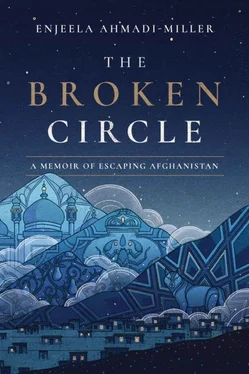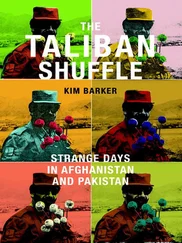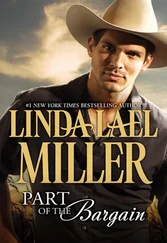“Our whole village is gone,” one of the women said. She told me about her young son, barely Zia’s age, who went off to the war with the other men in her village. She hadn’t seen him in months.
“They are fighting like these men,” an old woman told me, as she tended a small fire built with twigs and roots she’d scrounged from the ground.
Other mothers told the same stories. Their sons and husbands were off at war, probably hiding in another cave somewhere else in these barren mountains, cold, tired, but determined to expel these foreign soldiers. The sadness on their faces, the droops in their shoulders, as they went about their duties, caring for the children and cooking, appeared to be too deep to overcome. But they carried on, dwelling on stories of hope. “We will return and build our homes again when these men go away,” a young mother said.
“And what about you?” another woman asked me. “Will you return to Kabul?”
We had risked everything to escape. Yet I had no idea what my life would be like if we didn’t return. “Someday. I think we will.” Even as I spoke those words, I had the sense that I had spoken more wish than fact. Families all over the country were splintered.
My family was hardly the only one fractured by war—Mommy and my sisters were in New Delhi, Padar still in Kabul, and here we four were in an unlit mountain cave, eating over a crude cook fire, steps away from the horror of death. My family’s strife was but a drop in the flood of countrymen fleeing for their lives.
In another place and time, I would have wept at the staggering loss all around me. But weeping was of no use here. In these caves, the women’s only goal was to survive so they could rebuild their lives. Crying got no one closer to that end.
“There are many brave Afghans,” a wizened old man told me one night around the campfire, “who have already died.” His rifle leaned against the rock wall beside him. “I don’t know how long we can hold out against this army with tanks and jet bombers.”
“As long as there is one Afghan in this country,” said another old man at the campfire, “there will be an Afghanistan.” My padar had said that same thing so many times. When we didn’t have any electricity in Kabul or we sat around by candlelight, and he read to us or recited poetry, he’d always end the session by saying that to us. As if he were trying to give us some hope that our country and our people would survive these troubling times. And now sitting up here in this rocky cave, a village man in traditional dress, with a full beard and rustic ways, said the same thing. It was more than a saying but a deep belief that lived everywhere in this rugged country. If I were a boy, if I were older, I would not hesitate to defend my country.
At night, the freedom fighters snuck out and gathered food for all of us. Masood paid them, but I believed they would have brought us food regardless of our money. When they came back, they told us they had buried dead fighters and villagers. I often stood in the mouth of the cave, watching the beams of their flashlights, marveling at how brave and determined they were. Not one of them was willing to back down in the face of overwhelming odds that they would not win this war. Their adversaries had jet fighters, helicopters that spit bullets, and tanks and machine guns. These men had their rifles, RPG launchers, and their skill in living in the mountains. And their courage. It didn’t seem like enough.
One night I stood at the entrance watching them file out, and one of the bearded men stopped and patted me on the head. He must have seen the questions in my eyes. “I hope for the freedom of Afghanistan,” he said. “I am not afraid, even to die.” I watched them march single file into the night. They went willingly into the darkness with only the hope that their sacrifice would mean something more than spilled blood alone—freedom for their children and for me.
Like a bad storm on the other side of the mountains, we could hear the sounds of bombing and gunfire move away from us. One day Masood said it was time to leave. We packed and went back on the road. Men from the village helped us with some donkeys but would only allow us to take them to the next village. The donkeys knew the trails well, and we moved quickly along the rocky trails to the village.
I sat behind Zia, holding on to him tight as we made our way over the bumpy and rutted road. It took all of my energy to not fall off the donkey’s swaying back as it made its way up the treacherous path.
After a long climb, we reached another village. Masood spoke to one of the men, who said we were very close to Pakistan. The man advised us to stay there for the night as we still had a long climb ahead of us. I was excited about the thought of finally getting away from the fighting and death and seeing Padar. Yet I was also sad at what I would leave behind—my country, my home.
On the last night in Afghanistan, we were all asleep in a small camp of escaping refugees. Masood had us huddle together in a tight circle with our belongings beside us. I awoke to the rustling of a rucksack. I propped myself up on my elbows, peering into the darkness, wondering if someone was sick or hurt. The silhouette of someone leaning over Zulaikha’s belongings, wearing a pakol cap and a tunic, made my heart bang against my ribs. Someone was robbing us. I reached over as quietly as I could and just nudged Masood without saying a word.
He leapt up from his blankets, his machine gun already in his hand. He pointed the gun right at the man’s head. “Get out of here!” he shouted at the man.
The man froze, then raised his hands in the air to show his harmlessness. He slowly rose to his feet and backed away. Then he turned and ran out of the camp. Everyone in the camp woke up. Someone asked, “What happened?” Another man close to us called out, “There’s a robber around.” People startled awake and began checking their things.
“I’ve seen him stealing for the past two nights while we were in the caves,” Laila said. I was furious she hadn’t said anything. A few men arose and began searching for the thief, but Masood did not move from standing over us, his hand on his machine gun, his eyes searching the camp. Conversation rose in the camp. Men stoked the campfires and sat around sharing their experiences with robberies, break-ins, and the trouble they’d had on the road, and even though the stories were tragic, the talk itself among the community became a safe haven in the dark. Some sat around talking, others lay in their blankets, too exhausted to move. Masood stood over us, vigilant and alert. I tried to follow the conversation, but I was so fatigued, my limbs so heavy. I just wanted to surrender to the night. I lay back down. So did Zia and my sisters.
Our guide finally sat on his blanket, but he didn’t lie down. “Tomorrow we climb the biggest mountain. Get some sleep.”
I stared at the stars. They gleamed back at me, spread across the blackness in uncountable numbers, the earth and sky connected in pinpoints of light. This would be my last night sleeping in dirt. The ground was hard, but somehow even its hardness had become comfortable. I remembered owning a bed of feathers and springs, but I didn’t remember what that comfort was like. Now I had only a backpack as a pillow and the stars for my ceiling. They were luminous enough that I could have read a book by their light. I gathered my shawl over me to keep warm. The air had a crystal clarity to it; I could see forever into the sky. I let my thoughts roam to the happy moments when my whole family had been together. The words of “Within the Circle” came to mind:
Читать дальше













